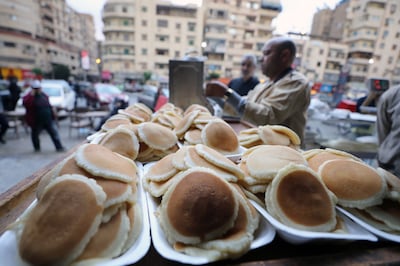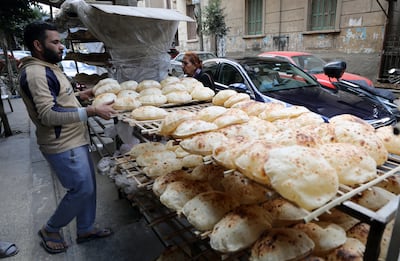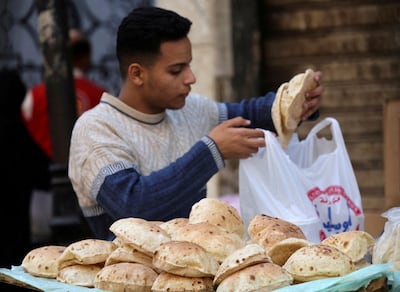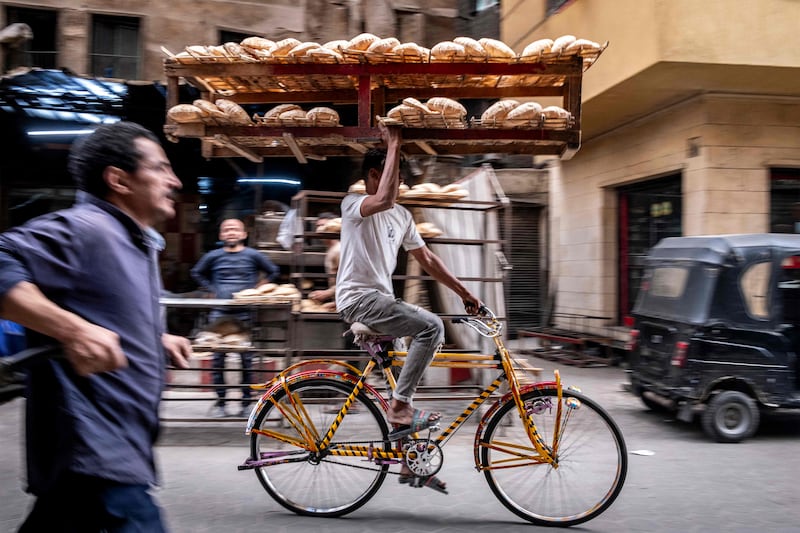Egypt’s free-market bakeries, whose operations and prices differ from ones that sell subsidised bread, have not brought down the price of loaves for customers despite a significant drop in the price of flour.
The Egyptian government announced last month that it would be implementing a three-month price control mechanism to keep prices down and threatened fines to any bakers who sold their bread at a higher price.
But several bakers in Cairo told The National on Tuesday that they are not following the government's warning, and are instead basing their prices on the market, setting up a potential showdown with the authorities.
The government had attempted to bring down prices of bread by increasing its supplies of flour, after receiving an injection of cash from several international financing deals, bringing the price of flour down by between 15 and 25 per cent, depending on the flour’s quality.
The drop in flour price should have brought down the price of non-subsidised loaves by a similar amount, according to a Sunday television statement from Abdullah Ghorab, the head of the bakeries union at the Federation of Egyptian Chambers of Commerce.
Mr Ghorab promised that the drop in flour prices would be reflected in the price of loaves once the Eid Al Fitr break was over on Monday.
However, The National visited several bakeries on Tuesday and found that, across the board, the price of a loaf of free market bread, which is known as “tourists’ bread” on the Egyptian street, had not come down.
A number of bakers said they had no plans to lower prices despite repeated calls from Mr Ghorab's bakeries union, a private sector entity made up of industry leaders that works with the government to administer the country’s bakeries.
“I have not brought down the price of bread in my store because I am still baking it with flour purchased before prices came down. When I finish the batch I have, I will look into bringing down the price,” said Ali Hamed, 51, a baker in Cairo’s Hadayek Al Qubba district.
However, Mr Hamed refused to provide exact dates of his past flour deliveries or a date for when his customers can expect lower prices.

Tourists' bread vs subsidised bread
So-called tourists’ bread is not regulated in Egypt, which means different bakeries can sell differing weights per loaf and charge whatever price they see fit. Bakeries set prices based on a variety of factors such as what grade of flour they use and the wealth of their customers.
Prices of tourists' bread range from about 2.5 to 4 Egyptian pounds ($0.05 to $0.08) per loaf depending on neighbourhood.
Subsidised bread is sold at a fixed price and weight of five piastres ($0.001) per 90g loaf. It is purchased using state bread ration cards, which are held by 71 million people in a country of 106 million, according to the latest data from the country's supply ministry.
The supply minister closely monitors the supply and distribution of subsidised flour, reducing the scope for profiteering compared to tourists' bread.
“If a subsidised baker raises prices, he is affecting the country’s poorest which will become a problem for the government very quickly because the people who buy it are not going to accept any increases in price,” explained Gamal Hassan, 61, a baker who sells tourists' bread in Cairo’s Heliopolis district.
“The baker will be immediately arrested, fined and even jailed. This makes sense because it’s a clearer crime if a baker has received flour at subsidised prices and sells bread at market prices,” he said.
“However, my customers are people who have more disposable income and can afford to pay market price for bread so they won’t cause as many problems if prices are a little higher. Also I buy my own flour from the free market so the government is not going to feel robbed by me as much as it would with a subsidised baker,” he told The National.

Subsidised flour from the supply ministry is also lower quality than others on the market, according to Mr Hassan, who said he sells his loaves for 3 Egyptian pounds each because he only uses so-called “five star” flour, the highest quality flour available on the market that his more affluent customers have come to expect.
“Other bakeries use whatever flour they like and price their goods accordingly. But we mustn’t forget that flour is not the entire matter and bakeries pay different rent rates based on the neighbourhoods they are in, which have gone up over the past year across the board. You also have to consider the recent rise in gas prices last month which we can’t carry alone. It rose by over 20 pre cent,” Mr Hassan said.
Another baker, Khaled Hema, 38, explains that while he will not be bringing down the price of bread, he would be increasing the weight of loaves.
Mr Hema also said he views the latest drop in price as temporary, given that the price has been generally rising since 2022.
“Why would I bring down my prices this week when I know they will just raise flour prices next month and I will have to bring them up again?” he asked.
“What I will do is make a bigger loaf while flour prices are lower and when they inevitably go up again, I will return to smaller loaves. I don’t need the government to monitor me, I am responsible before God for my business,” he said.

Egypt’s supply minister Ali El Moselhi said on Sunday that a committee would be convened to address the price of tourists’ bread and that following the meeting, price and weight controls will be implemented to ensure no one is raising prices needlessly.
The Egyptian Cabinet approved in March amendments to the country’s law that tasked the supply ministry with implementing a three-month price control on tourists’ bread and toughened penalties on profiteering.
Prices of essential food items in Egypt have been on a steady decline since the announcement of several financing deals under which the government would receive $50 billion from international partners.
Inflation for March dropped to 33.3 per cent, down from 35.8 per cent the month before, according to the country's statistics agency (Capmas).






